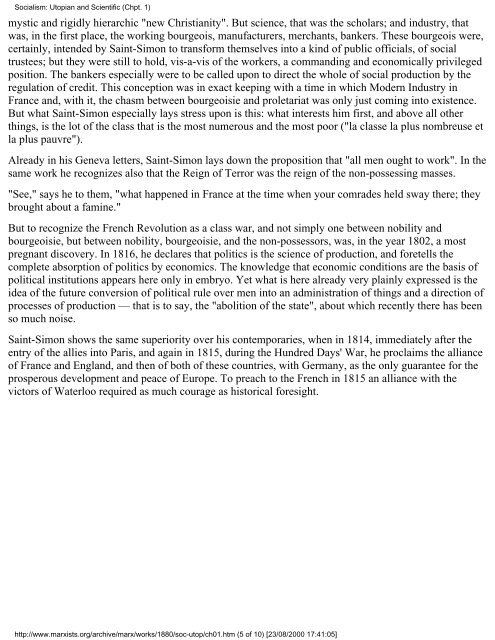Socialism: Utopian and Scientific - MIA
Socialism: Utopian and Scientific - MIA
Socialism: Utopian and Scientific - MIA
Create successful ePaper yourself
Turn your PDF publications into a flip-book with our unique Google optimized e-Paper software.
<strong>Socialism</strong>: <strong>Utopian</strong> <strong>and</strong> <strong>Scientific</strong> (Chpt. 1)mystic <strong>and</strong> rigidly hierarchic "new Christianity". But science, that was the scholars; <strong>and</strong> industry, thatwas, in the first place, the working bourgeois, manufacturers, merchants, bankers. These bourgeois were,certainly, intended by Saint-Simon to transform themselves into a kind of public officials, of socialtrustees; but they were still to hold, vis-a-vis of the workers, a comm<strong>and</strong>ing <strong>and</strong> economically privilegedposition. The bankers especially were to be called upon to direct the whole of social production by theregulation of credit. This conception was in exact keeping with a time in which Modern Industry inFrance <strong>and</strong>, with it, the chasm between bourgeoisie <strong>and</strong> proletariat was only just coming into existence.But what Saint-Simon especially lays stress upon is this: what interests him first, <strong>and</strong> above all otherthings, is the lot of the class that is the most numerous <strong>and</strong> the most poor ("la classe la plus nombreuse etla plus pauvre").Already in his Geneva letters, Saint-Simon lays down the proposition that "all men ought to work". In thesame work he recognizes also that the Reign of Terror was the reign of the non-possessing masses."See," says he to them, "what happened in France at the time when your comrades held sway there; theybrought about a famine."But to recognize the French Revolution as a class war, <strong>and</strong> not simply one between nobility <strong>and</strong>bourgeoisie, but between nobility, bourgeoisie, <strong>and</strong> the non-possessors, was, in the year 1802, a mostpregnant discovery. In 1816, he declares that politics is the science of production, <strong>and</strong> foretells thecomplete absorption of politics by economics. The knowledge that economic conditions are the basis ofpolitical institutions appears here only in embryo. Yet what is here already very plainly expressed is theidea of the future conversion of political rule over men into an administration of things <strong>and</strong> a direction ofprocesses of production — that is to say, the "abolition of the state", about which recently there has beenso much noise.Saint-Simon shows the same superiority over his contemporaries, when in 1814, immediately after theentry of the allies into Paris, <strong>and</strong> again in 1815, during the Hundred Days' War, he proclaims the allianceof France <strong>and</strong> Engl<strong>and</strong>, <strong>and</strong> then of both of these countries, with Germany, as the only guarantee for theprosperous development <strong>and</strong> peace of Europe. To preach to the French in 1815 an alliance with thevictors of Waterloo required as much courage as historical foresight.http://www.marxists.org/archive/marx/works/1880/soc-utop/ch01.htm (5 of 10) [23/08/2000 17:41:05]














![tyf Enf=O=n]lgg](https://img.yumpu.com/47584932/1/190x245/tyf-enfonlgg.jpg?quality=85)

